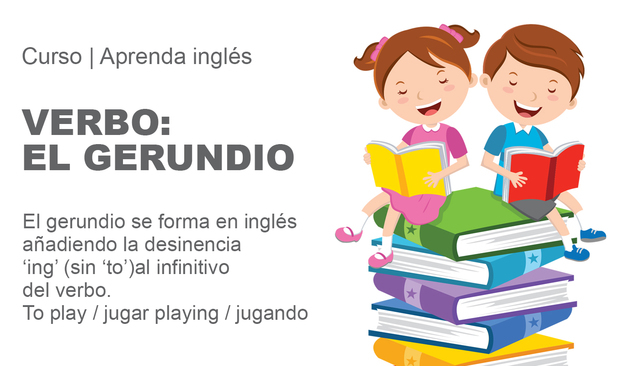
El gerundio se forma en inglés añadiendo la desinencia ‘ing’ (sin ‘to’) al infinitivo del verbo.
To play / jugar playing / jugando
CONSIDERACIONES
– Cuando el infinitivo termina en consonante precedida de una sola vocal pronunciada más fuerte, la consonante última se duplica:
To sit sitting (sentarse)
– Cuando el infinitivo termina en ‘-e’ muda, ésta desaparece.
To write writing (escribir)
– Cuando el infinitivo termina en ‘ie’ cambia a ‘y’ + ‘ing’
To lie lying (mentir)
USO DEL GERUNDIO
– Como sujeto en una expresión
Reading English is easier than speaking it / Leer inglés es más fácil que hablarlo
– En algunas expresiones de prohibición
No smoking / Prohibido fumar
– Se emplea para obtener la forma progresiva de los verbos
I am reading a book / Estoy leyendo un libro
– Cuando a un verbo precede de forma inmediata una preposición se utiliza la forma de gerundio.
After swimming I felt cold / Después de nadar me sentí resfriado
They had difficulty in finding a parking place / Tuvieron dificultad para encontrar una plaza de aparcamiento
– Como complemento de un verbo
His hobby is painting / Su hobby es la pintura
– Se utiliza frecuentemente después de los verbos ‘to go’ y ‘to come’
Come sailing with us next Saturday / Ven a navegar con nosotros el próximo sábado
EJERCICIO
A)- Escribe las siguientes frases con el verbo en gerundio (utiliza los verbos de ejemplo):
say / have / become / get up / play
1. He doesn’t like________ with other people.
2. Befote___________ a teacher, he worked in a farmer.
3. He left without__________ goodbye.
4. I hate____________ early in the morning.
5. They love____________ parties.
SOLUCIONES
1. He doesn’t like playing with other people.
2. Before becoming a teacher, he worked in a farmer.
3. He left without saying goodbye.
4. I hate getting up early in the morning.
5. They love having parties.